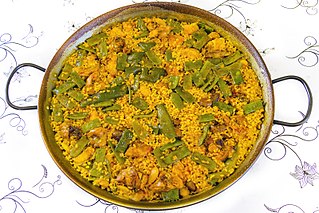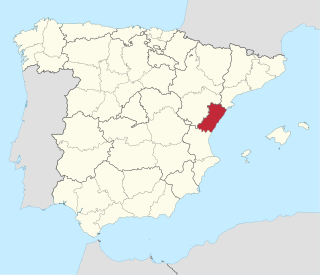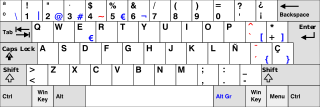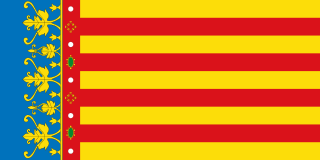
Catalan is a Western Romance language. It is the official language of Andorra, and an official language of three autonomous communities in eastern Spain: Catalonia, the Balearic Islands and the Valencian Community, where it is called Valencian. It has semi-official status in the Italian comune of Alghero, and it is spoken in the Pyrénées-Orientales department of France and in two further areas in eastern Spain: the eastern strip of Aragon and the Carche area in the Region of Murcia. The Catalan-speaking territories are often called the Països Catalans or "Catalan Countries".

Paella is a rice dish originally from the Valencian Community. Paella is regarded as one of the community's identifying symbols. It is one of the best-known dishes in Spanish cuisine.

Valencia is the capital of the province and autonomous community of the same name in Spain. It is the third-most populated municipality in the country, with 807,693 inhabitants within commune, 1,582,387 inhabitants within the urban area and 2,522,383 inhabitants within the metropolitan region. It is located on the banks of the Turia, on the east coast of the Iberian Peninsula on the Mediterranean Sea.

Valencian or the Valencian language is the official, historical and traditional name used in the Valencian Community of Spain to refer to the Romance language also known as Catalan, either as a whole or in its Valencia-specific linguistic forms. The Valencian Community's 1982 Statute of Autonomy officially recognises Valencian as the name of the regional language.

Castellón ; officially in Valencian: Castelló ) is a province in the northern part of the Valencian Community. It is bordered by the provinces of Valencia to the south, Teruel to the west, Tarragona to the north, and by the Mediterranean Sea to the east. The western side of the province is in the mountainous Sistema Ibérico area.

The Catalan Countries are those territories where the Catalan language is spoken. They include the Spanish regions of Catalonia, the Balearic Islands, Valencian Community, and parts of Aragon and Murcia (Carche), as well as the Principality of Andorra, the department of Pyrénées-Orientales in France, and the city of Alghero in Sardinia (Italy). It is often used as a sociolinguistic term to describe the cultural-linguistic area where Catalan is spoken. In the context of Catalan nationalism, the term is sometimes used in a more restricted way to refer to just Catalonia, Valencia and the Balearic Islands. The Catalan Countries do not correspond to any present or past political or administrative unit, though most of the area belonged to the Crown of Aragon in the Middle Ages. Parts of Valencia (Spanish) and Catalonia (Occitan) are not Catalan-speaking.

Villarreal is a city and municipality in the province of Castellón which is part of the Valencian Community in the east of Spain.

The Valencian Nationalist Bloc was a Valencian nationalist party in the Valencian Country, Spain. It was the largest party in the Coalició Compromís until 2021, when it was replaced in a refoundation process by Més–Compromís.
Republican Left of the Valencian Country is a Valencian left nationalist and republican party.

Valencian cuisine is a Mediterranean cuisine as cooked in the Valencian Community, Spain. Its basic ingredients are vegetables, seafood and meat. It is famous worldwide for its rices, such as paella, and its citrus fruits. The cuisine of neighbouring regions have given and received important contributions from Valencian gastronomy, amongst them Balearic cuisine, Catalan cuisine, Aragonese cuisine, Manchego cuisine and Murcian cuisine.

The majority of languages of Spain belong to the Romance language family, of which Spanish is the only one with official status in the whole country. Others, including Catalan/Valencian and Galician, enjoy official status in their respective autonomous regions, similar to Basque in the northeast of the country. A number of other languages and dialects belonging to the Romance continuum exist in Spain, such as Aragonese, Asturian, Fala and Aranese Occitan.

The Valencian National football team is the national football team for the Valencian Community, Spain. They are not affiliated with FIFA or UEFA, because it is represented internationally by the Spain national football team. It only plays friendly matches, and has not organised a fixture since 2006.
Casinos is a municipality in the comarca of Camp de Túria in the Valencian Community, Spain.

Catarroja is a municipality in the comarca of Horta Sud in the Valencian Community, Spain.

Chera is a municipality in the comarca of Requena-Utiel in the Valencian Community, Spain. The name in Valencian is Xera, but the local language is Spanish, not Valencian.
Valencian nationalism or Valencianism is a political movement in the Valencian Community, Spain.

The Valencian Community is an autonomous community of Spain. It is the fourth most populous Spanish autonomous community after Andalusia, Catalonia and the Community of Madrid with more than five million inhabitants. Its homonymous capital Valencia is the third largest city and metropolitan area in Spain. It is located along the Mediterranean coast on the east side of the Iberian Peninsula. It borders Catalonia to the north, Aragon and Castilla–La Mancha to the west, and Murcia to the south, and the Balearic Islands are to its east. The Valencian Community is divided into three provinces: Castellón, Valencia and Alicante.

Valencians are the native people of the Valencian Community, in eastern Spain. Legally, Valencians are the Spanish inhabitants of the community. Since 2006, the Valencian people are officially recognised in the Valencian Statute of Autonomy as a nationality "within the unity of the Spanish nation". The official languages of Valencia are Valencian and Spanish.

Coalició Compromís, also known as Compromís, is a Valencianist electoral coalition in the Valencian Community, Spain. The parties involved include Més-Compromís, the left-wing Valencian People's Initiative, and the ecologist group Greens Equo of the Valencian Country and independent members. Together, they defend Valencianist, progressive and ecological politics.
Levante-El Mercantil Valenciano is a Spanish regional newspaper from the Valencian Community that belongs to the Prensa Ibérica media holding. It had a brief precedent in Avance and it was the bulletin of the Valencian section of the FET y de las JONS. The newspaper later belonged to the Movimiento press. From 1977 it belonged to the Medios de Comunicación Social del Estado and in 1984 it was purchased by the private enterprise Prensa Valenciana.


















